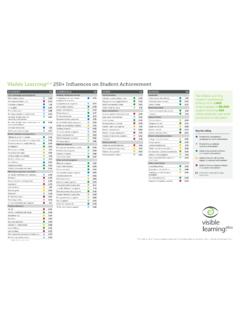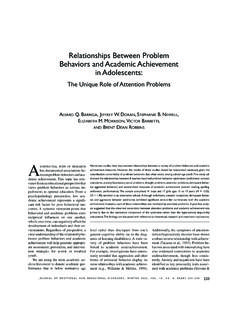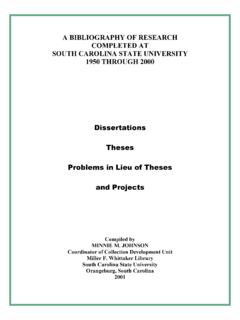Transcription of Stress, burnout, anxiety and depression among dentists
1 Sense. The same stressors that are stimu-lating or challenging in a positive sensealso may be debilitating if they accumu-late too rapidly. It is believed that settingunrealistic goals generates much of thenegative stress people feel. These goalsmay include the need for a particular stan-dard of income or technical setting lofty goals and high stan-dards is a noble theory, how people do thiscan create a load that often much stress a person can toleratecomfortably varies not only with the accu-mulative effect of the stressors, but alsowith such factors as personal health,amount of energy or fatigue, family situa-tion and age. stress tolerance usuallydecreases when a person is ill or has nothad an adequate amount of rest. Duringmajor life changes (birth of a child, seriousaccident to family member or oneself,divorce, death, geographic relocation),people s ability to tolerate stress also isreduced.
2 Past experience enhancespeople s ability to manage stress anddevelop coping skills. After several similarexperiences, people normally learn a stand-ard way to cope with a particular , Vol. 135, June 2004 JADACONTINUINGEDUCATION PRACTICEMANAGEMENTARTICLE1 stress , burnout , anxiety and depressionamong dentistsROBERT E. RADA, , ; CHARMAINE JOHNSON-LEONG, , can be a stressful profession. Thisstatement undoubtedly would invoke a greatdeal of discussion, illustrated with personalexperiences, from many practicing encounter numerous sources ofstress beginning in dental school. On entering clinicalpractice, they can find that the numberand variety of stressors often grow. Clin-icians experience numerous workplace,financial, practice management andsocietal issues for which they often areunprepared.
3 For some dentists , theseissues may significantly affect theirphysical health, mental health or disorders such as burnout , anx-iety and depression may result. Thesedisorders may have certain negativeeffects on dentists personal relationships, professionalrelationships, health and well-being. Fortunately, treat-ment modalities and prevention strategies can help den-tists conquer and avoid these disorders. The only limita-tion is their willingness to take care of can be defined as the biological reaction to anyadverse internal or external stimulus physical, mentalor emotional that tends to disturb the organism shomeostasis. If the compensating reactions are inad-equate or inappropriate, they may lead to , stress is not all bad. Certain stressors inspirepeople to make a greater effort; for example, a particu-larly demanding patient may motivate a dentist to workat an exceptionally high level, resulting in the creationof a highly esthetic and natural-looking stressors can stimulate people to grow profession-ally and personally, learn or improve.
4 stress is really anessential part of our stress is a term that often is used in a encounternumerous sources of professional Stress, beginning in dental school. This stress canhave a negative impact on their personaland professional are prone to pro-fessional burnout , anxiety disorders andclinical depression , owing to the nature ofclinical practice and the personality traitscommon among those who decide to pursuecareers in dentistry. Fortunately, treatmentmodalities and prevention strategies canhelp dentists conquer and avoid these enjoy satis-fying professional and personal lives, den-tists must be aware of the importance ofmaintaining good physical and mentalhealth. A large part of effective practicemanagement is understanding the implica-tions of can have a negativeimpact on dentists personal and 2004 American Dental Association.
5 All rights stress toleranceoften will varyaccording to thepeople who surroundus; being surroundedby significant andsupportive others canhelp people resist theeffects of stress . Den-tists and dental auxil-iaries who like eachother and work welltogether can reinforceone another and helpraise one another stolerance of AND DENTISTRYD entists perceive den-tistry as being more stressful than other study of more than 3,500 dentists foundthat 38 percent of those surveyed always or fre-quently were worried or , 34percent of the respondents said that they alwaysor frequently felt physically or emotionallyexhausted, and 26 percent said they always orfrequently had headaches or backaches. Thesesymptoms often are associated with anxiety anddepression. Problems with time management andstaying on schedule appeared in several is interesting to note that anxious patientsoften create less stress for dentists than runningbehind schedule.
6 Other stressors that appear inthese surveys include coping with difficult oruncooperative patients, the workload, govern-mental interventions and a constant drive fortechnical humans are exposed to challenging envi-ronments, they exhibit a broad range of physiolog-ical and emotional responses that vary in type andstrength, according to how well they can cope withthe demands. When people evaluate their workenvironment for its effect on their stress and satis-faction, they need to examine the nature of workdemands, the control given to people dealing withthe demands, the support they receive from otherpeople in the work environment and the supportthey receive in terms of table lists some of the psychological effectsof stress . Many of the psychological signs of stressmanifest themselves as physiological physical disorder reported most frequently bydentists is lower back pain.
7 Other physical mani-festations include headaches and intestinal orabdominal problems. among the psychologicaldisorders associated with stress are anxiety anddepression. While in most cases these disordersare not so severe that they require intervention,they may interfere with the dentist s professionalperformance and quality of stress -related problems associated withdentistry arise from the work environment andthe personality types of the people who choose theprofession. The operatory usually is small, andthe dentist s focus is on an even smaller space,the oral cavity. dentists are required to sit stillfor much of their workday, making very preciseand slow movements with their hands, whiletheir eyes remain focused on a specific spot. Isola-tion from other dentists also is common. Addition-ally, a study has shown that dentistry tends toattract people with compulsive personalities, whooften have unrealistic expectations and unneces-sarily high standards of performance, and whorequire social approval and general, as dentists number of clinical expe-riences increase, they report a lower overall per-ception of stress .
8 Only stress resulting from officemanagement remains high, despite the dentists practice may be, in part, a con-sequence of dental assistants perception of stres-sors as being different from those of the dentistswith whom they work. Role ambiguity, underuseof skills and low self-esteem are important factorscontributing to stress among dental , Vol. 135, June 2004789 PRACTICEMANAGEMENTTABLE PSYCHOLOGICAL EFFECTS OF STRESSFUL SITUATIONS.* Bored, restless,lethargicAroused, lively,funHigh arousal,tension, excitementTorpidity, loss ofdirection, helplessnessChallenged, enjoy-ment, satisfaction,self-efficacyAnger, fear, worry,tiredness, accom-plishment (ifcoping)Dismay, disillusionment, depression , sense offailure, alienationAchievement,feeling of adequacyor competency, highself-esteemAnxiety, depression , exhaustion, loss ofself-confidenceWeak Low DemandsModerate ChallengingDemandsStrong ExcessiveDemands* Adapted with permission of the publisher from OFSTRESSORSDURATION OF STRESSORSS hort TermMedium TermLong TermCopyright 2004 American Dental Association.
9 All rights , dentists receive relatively littletraining in the interpersonal dimensions of prac-tice management, so they may lack the skills toremedy these BURNOUTOne of the possible consequences of chronic occu-pational stress is professional defined by three coexisting , the person is exhausted mentally or emo-tionally. Second, the person develops a negative,indifferent or cynical attitude toward patients,clients or co-workers; this is referred to as deper-sonalization or dehumanization. Finally, there isa tendency for people to feel dissatisfied withtheir accomplishments and to evaluate them-selves negatively. The effects ofburnout, although work-related,often will have a negative impact onpeople s personal relationships ,14 burnout is best described as agradual erosion of the person.
10 Onestudy showed that certain aspectsof dental practice, such as time pressures,patient-related problems and management ofauxiliary staff, all were relevant stressors. How-ever, lack of career perspective was the most cru-cial aspect in the development of isinteresting to note that health professionals whoburn out relatively early in their careers weremore likely to stay in their chosen career andadopt a more flexible approach to their work rou-tines. This suggests that burnout does not neces-sarily have to result in far-reaching negative who looked at threetypes of clinicians found that general dentists andoral surgeons had the highest levels of burnoutand that orthodontists had the lowest levels ,17 anxiety DISORDERSA nxiety disorders are serious medical illnessesthat affect approximately 19 million anxiety disorder has its own distinct fea-tures, but all anxiety disorders are boundtogether by the common theme of excessive, irra-tional fear and dread.






